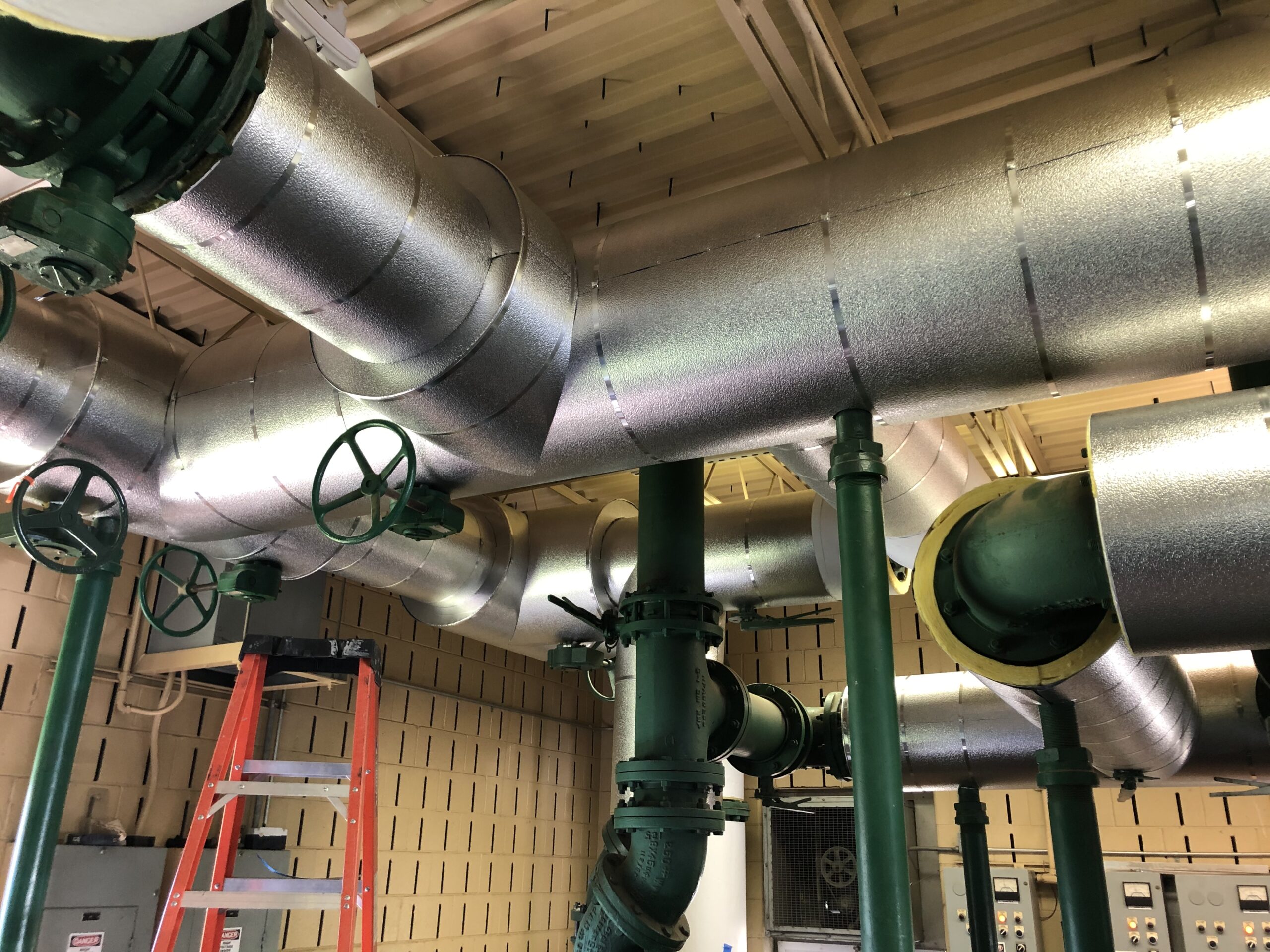What Is Mechanical Insulation & Why It Matters [Beginner’s Guide]

Mechanical insulation has been referred to as the “forgotten technology” when it comes to energy efficiency in buildings. What is mechanical insulation and why do engineers think it’s so important now and in the future?
What’s the Wrap? Mechanical Insulation for Beginners
Not sure what mechanical insulation is? The answer likely lies closer than you think. Engineers and contractors refer to mechanical insulation as any material used to insulate stand-alone equipment or processes inside or outside a building, rather than the “envelope” insulation usually found built into the walls and ceilings of structures.
You’ll find mechanical insulation wrapped around ductwork and piping in attics and basements or possibly encasing hot water heaters and noisy generating equipment as well. In fact, mechanical insulation can be used anywhere that you need to manage sharp differences in energy levels in order to:
- Reduce heat or cooling loss
- Minimize expansion and contraction
- Lower noise levels
- Prevent burns or limit exposure to heat or cold
- Prevent or suppress fires
Insulation materials also often serve to protect workers from bumping or scraping against sharp or exposed surfaces.
What Are the Most Common Mechanical Insulation Applications?
With this in mind, let’s think about what mechanical insulation looks like in practice. Take a look around your home or almost any commercial or industrial facility, and you’re likely to see some type of mechanical insulation in the following places:
- Pipe insulation: Foam or woven blanket wraps secured around piping will keep hot water hotter and prevent cold water pipes from bursting in freezing conditions.
- HVAC ductwork: Foam wraps or pre-formed insulation will improve heating and cooling efficiency, especially in large facilities.
- Furnaces and boilers: Insulation helps gas and electric heaters run more efficiently, reducing energy costs and equipment wear and tear.
- Chilled products: Insulating pipes containing chilled liquids reduces surface condensation, improving the lifetime of air conditioning and refrigeration units and piping. Limiting temperature variations also improves the efficiency of many industrial processes.
- Storage tanks: Keeping contents at ideal temperatures and limiting energy loss improves product quality and process efficiencies.
- Noisy equipment: Insulate compressors, generators, air handlers, and other loud equipment to improve worker comfort and meet OSHA-mandated exposure limits.
What Is Mechanical Insulation Made From?
Any material that is a poor conductor of heat or sound can be used as a mechanical insulator, particularly substances that hold a lot of enclosed air spaces relative to their volume. For this reason, mechanical insulation products tend to be made from materials that are:
- Cellular, such as expanded plastics and closed-cell foams like polyisocyanurate
- Fibrous, such as fiberglass or mineral wool
- Flaked, such as vermiculite or other processed minerals
- Granular, such as perlite or calcium silicate
- Reflective, such as silver-painted insulation panels
Mechanical insulation products come in different forms for different applications, including:
- Panels and tiles for installation around equipment
- Rolls of woven or expanded material for wrapping pipes or ducts in tight spaces
- Loose or granular products for filling up irregular spaces
- Sprayable expanding foam for insulating inaccessible places
What Are the Measurable Benefits of Mechanical Insulation?
While the practical advantages of mechanical insulation are easy to see, ensuring that equipment and transfer infrastructure in schools, hospitals, offices, retail centers, and factories is properly insulated has many bottom-line benefits. These include:
- Reduced overall energy costs
- Better heating and cooling performance and efficiency
- Reduced process variability due to temperature variations
- Longer lifespans for mechanical equipment
- Improved fire safety
These are real gains, measurable in cheaper heating and cooling bills, increased output or productivity, lower maintenance costs, and improved product quality. And, as energy costs continue to climb, relatively modest investments in “low tech” fixes like mechanical insulation will yield ever-larger dividends in cost savings and improved efficiencies.
The “Forgotten Technology”
At the same time, technologies like mechanical insulation play a key part in the broader energy transition. While much of the focus is on paradigm-shifting technologies like electric vehicles or wind and solar power generation, many experts have pointed to the outsized importance of simply improving efficiency by properly insulating existing buildings and equipment.
Here’s where humble mechanical insulation has a starring role to play. Properly insulating natural gas-powered water heaters will immediately reduce your on-site carbon footprint. What’s more, ensuring that furnaces and heated or chilled pipes are properly protected will help to reduce emissions from the power plants serving your home or facility.
By how much? National Insulation Association (NIA) president David J. Cox wrote recently that insulating eight feet of 4-inch pipe running water at 350°F with standard pipe insulation would offset the total emissions produced by a 2.7-liter truck driving 20,000 miles. That’s as much carbon offset as planting 360 trees or switching out 310 43W incandescent bulbs for LEDs.
If that doesn’t sound like a lot, consider that the NIA estimates that between 10% and 30% of currently installed mechanical insulation is already damaged or missing. Maintaining just this existing installed base would generate savings of $3.6 billion annually, create more than 27,000 jobs per year, and reduce annual greenhouse gas emissions by 83 billion pounds!
Unlock Energy Savings With MultiService Industries
These are real savings accessible today using low-cost existing technology and without the assistance of government subsidies, economies of scale, or carbon credit trading. Many of these potential savings likely exist in your facilities and can be identified by conducting a building energy audit or contacting an insulation specialist like MultiService Industrial.
Serving both commercial and industrial facilities, MultiService Industrial delivers high-quality mechanical insurance solutions to keep heat where it belongs, prevent condensation, reduce noise, and cut energy consumption.
Our highly experienced team is ready to deliver the very best mechanical insulation services for your new construction, extension, or repair projects. Click below to find out more!